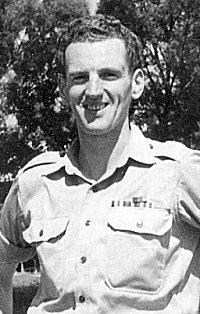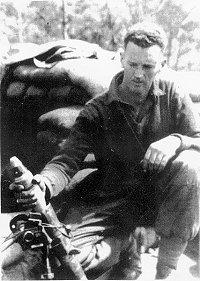QUICK THINKING
DENNIS ROBINSON
In the annals of World Military History, the Battle of Maryang San codenamed 'Operation Commando', would probably only warrant a brief mention, just another"straightening of the line" skirmish to ensure the United Nations (UN) commandheld favourable positions now that the Korean War had, after highly mobile initial stages,developed into static trench warfare. But, to me, it was a big "deal". Activeservice was not a new experience for me as I had served with the British Army in Europeand in the occupation of Gernany after the end of World War II.
Some explanation is required here. The Chinese always attack to thesound of bugles, whether they were a form of signal, or a rallying call, or perhaps todemoralize the enemy is not known. Whatever the reason, the first of the Chinese assaulttroops soon appeared in the valley. Their artillery then laid down a barrage on ourpositions and the enemy soldiers started to come up the very steep slope towards us on ourhilltop position. On checking our ammo we found that we only had 9 rounds between us, Ihad 5 and my mate had 4 in the magazine of his .303 Lee Enfield rifle. By this time theenemy were getting very much closer and I was starting to wonder why I had joined theAustralian Army leaving the green fields of England to face a situation like this. Therewas, however, no time for recriminations. The first of the Chinese were getting prettyclose, and as we were a good way ahead of the rest of the Section we had to size up thesituation, if there was time for quick thinking, it was now. It was no use trying to bugout so I said to my mate, "There are about 500 of those Bastards out there but I havea plan that might stop them." My mate replied, "with only 9 rounds between us itbetter be good." "If you take a good look" I said, "you will see thatthere are two officers leading them up the hill, you get the one on the left and I willget the one on the right, and don't miss or we have had it." By this time the Chinesewere about 25 yards away and when I said "NOW!", we fired together, and did notmiss. On being hit the 2 Officers fell backwards onto the men behind them, and with thesteep slope you can imagine all those Chinese falling back onto one another. It was a verygood picture of a set of dominoes falling. Whilst this was all happening my mate and Iwere able to get out and back to the rest of the Company, under the Command then of Major'Wings' Nicholls, and withdraw to better defensive positions.
It was about this time that the world blew up in my face. I can recallthe flash of the explosion and something with the force of an express train hitting me. Iwoke up in Mobile Surgical Hospital (Mash) in Seoul. Maryang San was taken by the 3Battalion Royal Australian Regiment and Operation Commando was a success. To the men of BCompany I say well done. To those men of the Chinese Army, I say, "Never come up asteep slope in front of the Australians or we will knock you all down with just 2shots." As a matter of interest, I never regretted joining the Australian Army and Iam proud to have served with 3 Battalion. I recovered from my wounds, served out my Tourof Duty in Korea and my term of enlistment and remained in Australia. I am now no longerreferred to, nor do I consider myself as, "A Pommy Bastard".
|
|

